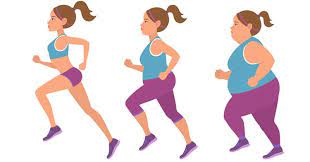Maintaining a healthy weight is a goal many aspire to achieve, and while dietary choices play a crucial role, the significance of physical activity in weight management cannot be overstated. In this article, we will delve into the multifaceted role that regular physical activity plays in achieving and sustaining a healthy weight. From burning calories to enhancing metabolism and supporting overall well-being, we’ll explore how exercise can be a cornerstone in the journey toward effective weight management.
I. Introduction
A. The Interplay of Diet and Exercise
Introducing the dynamic relationship between diet and physical activity in achieving and maintaining a healthy weight.
B. The Holistic Approach to Weight Management
Emphasizing the importance of a holistic approach that combines sensible dietary choices with regular physical activity for long-term success.
C. Debunking Common Myths
Addressing misconceptions about the sole reliance on diet or exercise for weight management and advocating for a balanced approach.
II. Caloric Expenditure through Physical Activity
A. The Basics of Calories and Energy Balance
Explaining the concept of energy balance, where calories consumed are balanced against calories expended through physical activity and metabolism.
B. Types of Physical Activities
Highlighting the diverse forms of physical activity, from aerobic exercises like walking and jogging to resistance training and flexibility exercises.
C. Impact on Caloric Expenditure
Discussing how different types and intensities of physical activity contribute to caloric expenditure, aiding in weight loss or maintenance.
III. Metabolic Impact of Regular Exercise
A. Boosting Metabolism
Exploring how regular exercise can boost metabolism, increasing the number of calories burned at rest and supporting weight management efforts.
B. Preserving Lean Muscle Mass
Discussing the role of exercise in preserving lean muscle mass during weight loss, preventing a decrease in metabolic rate.
C. Post-Exercise Caloric Burn
Highlighting the phenomenon of post-exercise oxygen consumption (EPOC), where the body continues to burn calories after a workout.
IV. Appetite Regulation and Weight Loss
A. Exercise and Appetite Hormones
Examining the impact of exercise on appetite-regulating hormones, potentially helping individuals make healthier food choices.
B. Psychological Benefits
Discussing the psychological benefits of exercise in managing stress, anxiety, and emotional eating, contributing to weight loss or weight maintenance.
C. Long-Term Weight Management
Highlighting the role of regular physical activity in long-term weight management, beyond initial weight loss efforts.
V. Building a Sustainable Exercise Routine
A. Finding Enjoyable Activities
Encouraging individuals to explore and engage in physical activities they enjoy, increasing the likelihood of adherence to an exercise routine.
B. Incorporating Variety
Highlighting the importance of incorporating variety in physical activities to target different muscle groups and prevent boredom.
C. Gradual Progression
Emphasizing the significance of gradual progression in intensity and duration to avoid injury and create sustainable habits.
VI. Physical Activity and Health Beyond Weight
A. Cardiovascular Health
Exploring the cardiovascular benefits of regular physical activity, including improved heart health, blood pressure regulation, and reduced risk of cardiovascular diseases.
B. Mental Well-being
Discussing the positive impact of exercise on mental health, including stress reduction, improved mood, and enhanced cognitive function.
C. Overall Fitness and Functionality
Highlighting how regular physical activity contributes to overall fitness, supporting daily activities and promoting a higher quality of life.
VII. Considerations for Weight Management Programs
A. Customization to Individual Needs
Emphasizing the need for personalized exercise programs tailored to individual fitness levels, preferences, and health conditions.
B. Collaboration with Health Professionals
Encouraging collaboration with healthcare professionals, such as dietitians and fitness experts, for a comprehensive approach to weight management.
C. Lifestyle Integration
Advocating for the integration of physical activity into daily life, such as walking or cycling to work, taking the stairs, and other simple yet effective habits.
VIII. Conclusion
A. Recap of Key Points
Summarizing the vital role that physical activity plays in weight management, from caloric expenditure to metabolic impact and overall health benefits.
B. Encouragement for Sustainable Habits
Encouraging individuals to view physical activity not only as a means of weight management but as a lifelong habit for optimal health and well-being.
FAQs
- How much exercise is needed for effective weight management?
- The amount of exercise needed varies, but aiming for at least 150 minutes of moderate-intensity aerobic exercise or 75 minutes of vigorous-intensity exercise per week is a general guideline. Consulting with a healthcare professional can provide personalized recommendations.
- Is weight training important for weight loss, or is cardio sufficient?
- While both cardio and weight training contribute to weight loss, incorporating resistance training is valuable. Weight training helps preserve lean muscle mass, boosting metabolism and supporting long-term weight management.
- Can I lose weight through exercise alone without changing my diet?
- While exercise plays a crucial role, combining it with a balanced diet is the most effective approach for weight management. Caloric intake and expenditure need to be considered together for sustainable and healthy weight loss.
- What if I have physical limitations or health conditions?
- Individuals with physical limitations or health conditions should consult with a healthcare professional before starting an exercise program. Customized, low-impact activities may be recommended to accommodate specific needs.
- Is it possible to maintain weight through moderate exercise, or do I need intense workouts?
- Moderate-intensity exercise can be effective for weight management, especially when combined with dietary changes. Consistency is key, and choosing activities that are enjoyable and sustainable is crucial for long-term success.

